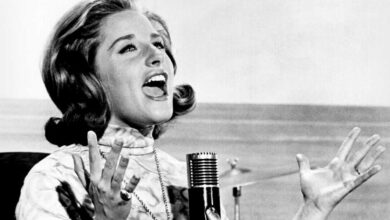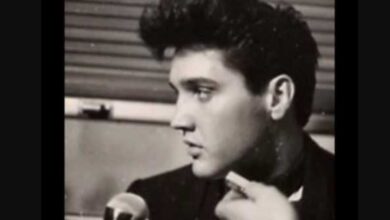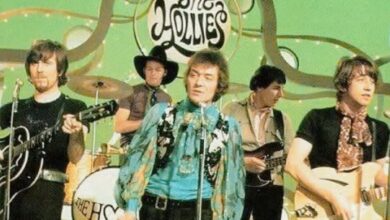Lulu’s “To Sir With Love” Becomes a Cultural Touchstone of 1967, Blending British Pop with American Soul and Sentiment
Released in 1967 as the theme for the film of the same name, Lulu’s “To Sir With Love” would go on to become one of the most beloved ballads of its time—an unexpected powerhouse that bridged film and music, British and American audiences, and teen pop with soul-infused maturity. Though she had already found some success in the UK, this single marked her true breakthrough in the United States. It didn’t just climb the charts—it dominated them, reaching No. 1 on the Billboard Hot 100 and remaining there for five consecutive weeks, ultimately becoming the top-selling single in the U.S. for the entire year. That feat is all the more remarkable considering that the song was never even commercially released as a single in Lulu’s native Britain.
Lulu, born Marie McDonald McLaughlin Lawrie in Glasgow, Scotland, was just a teenager when she first burst onto the scene with her powerhouse voice and unmistakable Scottish charm. Nicknamed “Lulu the Pocket Dynamo” for her diminutive stature and explosive energy, she brought an authenticity and vocal strength that belied her years. Her 1964 cover of the Isley Brothers’ “Shout” made her a star in the UK, but she was still looking to solidify her identity as more than a one-hit wonder. With “To Sir With Love,” Lulu found not just another chart success, but a defining moment—one that allowed her to show emotional range and depth far beyond her teen pop image.
The story behind “To Sir With Love” is steeped in emotion and cinema. The song was written specifically for the film by British composer Mark London and lyricist Don Black. The film, which starred Sidney Poitier as an idealistic teacher in a rough East End London school, explored themes of racial tolerance, education, and respect—heady material for a pop song. But the lyrics struck a universal chord: gratitude, growth, and the pain of saying goodbye to a formative figure. Lulu, who also acted in the film, sang the song as a final tribute to Poitier’s character in the climactic scene, giving it a narrative and emotional weight that few pop singles could rival.
The recording process captured this deep emotional resonance. Produced by Mickie Most, known for his work with The Animals and Donovan, the track featured understated instrumentation that allowed Lulu’s voice to take center stage. The gentle rhythm section, sweeping strings, and soft harmonies served as the perfect canvas for her vocals, which moved from restrained vulnerability to a soaring, tear-stained crescendo. Her performance was neither flashy nor overly sentimental—it was honest. That honesty is what connected so powerfully with listeners across demographics and continents.
Upon its release in the U.S., the song received an immediate warm reception, largely due to the film’s success and the growing American fascination with British culture during the height of the British Invasion. It shot up the Billboard Hot 100 and took the No. 1 spot in late October, displacing The Box Tops’ “The Letter.” It remained there until Thanksgiving and ended up topping Billboard’s year-end chart. Ironically, in the UK, the song was relegated to a B-side and received little attention—a strange twist for a record so tied to British identity and experience.
Culturally, “To Sir With Love” resonated with a generation experiencing social upheaval and reevaluating traditional structures of authority. At a time when student-teacher relationships were often depicted as either strict or superficial, the film and its song offered a vision of education rooted in mutual respect. The ballad’s heartfelt tone and universal message gave it legs far beyond the movie’s runtime, and its success marked one of the rare times a film song fully transcended its cinematic origin to become a pop standard.
The song’s triumph in America opened the floodgates for Lulu’s stateside career. No longer seen as just a British teen star, she was embraced by a more mature audience and soon found herself performing on American variety shows and touring internationally. The exposure raised her profile immensely and laid the groundwork for future collaborations with artists like David Bowie and her role as host of her own TV variety show later in the 1970s.
“To Sir With Love” also had a lasting influence on how pop ballads could intersect with cinema. It blurred the lines between soundtrack and radio hit, and in doing so, paved the way for future songs like “My Heart Will Go On” and “I Will Always Love You” to dominate both mediums. Its success demonstrated that a song could both encapsulate a film’s emotional core and become a standalone musical statement.
Over the years, the song has been covered by several notable artists. The most prominent rendition came from Al Green in 1978, who brought a gospel-tinged depth to the track, transforming it into a spiritual homage. Other interpretations by singers like Natalie Merchant and Vonda Shepard leaned into its nostalgic quality, while punk artist Patti Smith even performed it live, underscoring its broad cultural reach and ability to resonate across genres.
Behind the scenes, the song was a bright spot in a transformative period for both Lulu and her collaborators. Don Black, the lyricist, would go on to win an Academy Award for “Born Free,” while composer Mark London, Lulu’s future husband at the time, solidified his status as a skilled tunesmith. For Lulu herself, the song’s success coincided with a maturing public image—she was no longer just the bubbly teen from Glasgow but a young woman with emotional depth and global resonance.
More than half a century later, “To Sir With Love” remains a mainstay on classic pop radio and often appears on lists of the greatest movie songs of all time. Its timeless melody and heartfelt lyrics have kept it alive in the public consciousness, whether played at graduation ceremonies or revisited in retrospectives on 1960s pop culture. It’s one of those rare songs that continues to evoke genuine emotion decades after its release.
The influence of the track can still be felt in how contemporary pop ballads are written and used in film. Its blend of narrative weight, emotional delivery, and accessible melody became a blueprint for countless movie themes and reflective anthems. In many ways, “To Sir With Love” proved that a song could serve as both a plot device and a chart-topping hit, without compromising either function.
Lulu would go on to achieve many milestones, including performing the title song for the James Bond film The Man with the Golden Gun and scoring hits in multiple decades. Yet she has often acknowledged that no song came close to the emotional significance and lasting legacy of “To Sir With Love.” It’s the track that defines her for many and remains the most profound moment in her discography.
Ultimately, “To Sir With Love” endures because it taps into something deeply human: the bittersweet gratitude we feel toward those who shape us. In a time of rebellion and change, it reminded the world of the quiet strength in respect and farewell. Its success was not just a musical triumph, but a cultural one—uniting generations, nations, and genres with one simple, beautiful goodbye.



